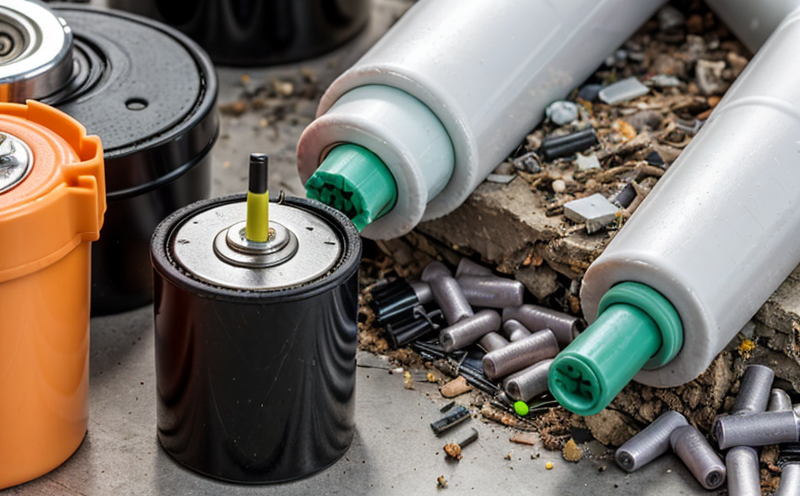IEC 63330 End-of-Life Testing of UAV Lithium-Ion Batteries
The IEC 63330 standard is pivotal in ensuring the safe and efficient recycling of end-of-life batteries, particularly those used in Unmanned Aerial Vehicles (UAVs). Lithium-ion batteries present unique challenges for recycling due to their high energy density and complex chemical composition. This service focuses on testing these batteries according to IEC 63330, which provides a comprehensive framework for evaluating the safety, performance, and environmental impact of lithium-ion batteries at the end of their useful life.
The importance of this standard cannot be overstated in an era where electronic waste is growing rapidly. As UAVs are increasingly deployed across various sectors including agriculture, surveillance, and delivery services, it becomes crucial to ensure that their batteries can be recycled responsibly without posing environmental risks. IEC 63330 addresses these needs by offering a standardized approach to testing the cells, modules, and packs of lithium-ion batteries.
The service involves rigorous testing procedures designed to evaluate battery performance in various real-world scenarios, including temperature cycling, overcharging, short-circuiting, and forced discharge. These tests are essential for identifying potential hazards that could arise during recycling or disposal processes. By conducting these tests, we ensure that the batteries meet stringent safety standards, thereby promoting sustainable practices within the industry.
Our team of experts uses cutting-edge equipment to perform these tests accurately and efficiently. The process begins with thorough preparation of the specimens according to IEC 63330 guidelines. This includes charging the batteries to a specified state-of-charge (SOC) level, ensuring consistency across all samples. Once prepared, the batteries undergo multiple cycles of stress testing to simulate typical operational conditions and extreme scenarios.
The results of these tests are meticulously recorded and analyzed using advanced software tools. Our laboratory adheres strictly to international standards such as IEC 63330, ASTM D7461, and EN 50636-2 to ensure compliance with global regulations. Compliance reports provide detailed insights into the battery’s behavior under different stress conditions, highlighting any weaknesses or strengths that need addressing.
Understanding the implications of these tests is vital for quality managers, compliance officers, R&D engineers, and procurement teams involved in UAV development and deployment. By adhering to IEC 63330 standards during end-of-life testing, stakeholders can make informed decisions regarding battery reuse, repurposing, or recycling.
Moreover, this service offers valuable data points for continuous improvement efforts within the industry. It helps manufacturers identify areas where enhancements could lead to more efficient and safer recycling processes. For example, insights gained from these tests have been instrumental in developing new protocols for handling hazardous materials safely during recycling operations.
Scope and Methodology
| Test Parameter | Description |
|---|---|
| Temperature Cycling | Simulates extreme environmental conditions to assess battery durability. |
| Overcharging | Evaluates the battery’s tolerance to prolonged periods of excessive charging voltage. |
| Short-Circuiting | Determines how quickly a short circuit can be detected and isolated by protective circuits within the battery. |
| Forced Discharge | Tests the battery’s ability to recover after being subjected to forced discharge conditions. |
| Specimen Preparation | Description |
|---|---|
| Charging | All batteries are charged to a specific state-of-charge (SOC) level prior to testing. |
| Cycling | Batteries undergo multiple cycles of discharge and recharge according to IEC 63330 specifications. |
| Conditioning | Any necessary conditioning steps are performed to ensure accurate test results. |
Eurolab Advantages
Our laboratory offers several advantages when it comes to providing IEC 63330 end-of-life testing for UAV lithium-ion batteries:
- Comprehensive Testing Capabilities: We possess state-of-the-art facilities capable of performing all required tests specified by the standard.
- International Recognition: Our compliance reports are recognized globally, ensuring seamless integration into international supply chains.
- Prompt Turnaround Times: Leveraging our efficient processes allows us to deliver results quickly without compromising quality.
- Expertise and Experience: Our team comprises highly skilled professionals with extensive experience in battery testing and recycling.
- Cost-Effective Solutions: By offering competitive pricing, we make this service accessible to businesses of all sizes.
These advantages position us as leaders in the field of UAV lithium-ion battery recycling and end-of-life testing. With our expertise and resources, you can trust that your batteries will receive the best possible assessment under IEC 63330 standards.
Quality and Reliability Assurance
- ISO/IEC 17025 Accreditation: Our laboratory is accredited to ISO/IEC 17025, ensuring the highest level of quality in our testing services.
- Regular Calibration: All instruments used are regularly calibrated to ensure accurate and reliable test results.
- Data Integrity: We implement robust data management practices to maintain integrity throughout the testing process.
- Continuous Improvement: Our team continuously updates its knowledge base through ongoing training and participation in industry forums.
We are committed to maintaining the highest standards of quality and reliability, ensuring that every test conducted adheres strictly to IEC 63330 requirements. This commitment reflects our dedication to delivering accurate, reliable results that meet or exceed your expectations.





